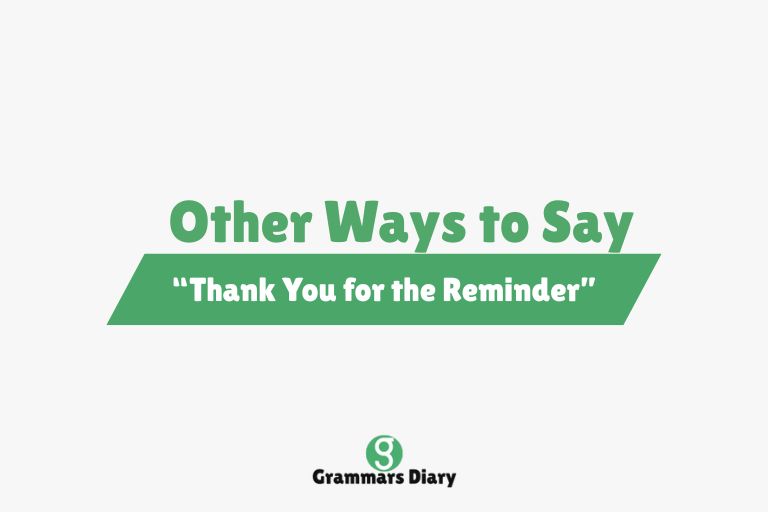Saying “thank you for the reminder” is a polite and thoughtful way to acknowledge when someone helps you remember something important—whether it’s a meeting, deadline, task, or personal obligation. It expresses appreciation for their effort in keeping you informed and organized. However, using the same phrase repeatedly can start to sound repetitive, especially in professional or formal communication. Thankfully, there are plenty of alternative expressions that convey the same meaning while adding variety, tone, or context to your message.
This article explores 22 alternative ways to say “thank you for the reminder,” providing clear explanations and long-form example sentences so you can choose the best expression depending on the situation, whether it’s casual, professional, or somewhere in between.
Other Ways to Say “Thank You for the Reminder”
1. I appreciate the heads-up.
Example: “I appreciate the heads-up about tomorrow’s deadline—it definitely would’ve slipped my mind otherwise.”
Meaning: Shows gratitude for someone alerting you in advance.
Usage: Ideal in both casual and semi-professional contexts, especially when you want to acknowledge a timely notice.
2. Thanks for keeping me on track.
Example: “Thanks for keeping me on track with the meeting schedule—it’s easy to lose track on such a busy day.”
Meaning: Acknowledges the other person’s role in helping you stay organized or punctual.
Usage: Great for workplace settings or collaborative environments.
3. I’m grateful for the reminder.
Example: “I’m grateful for the reminder to submit the form before noon—I completely forgot it was due today.”
Meaning: A slightly more formal version that expresses sincere appreciation.
Usage: Suitable for professional emails or formal interactions.
4. Thank you for the timely nudge.
Example: “Thank you for the timely nudge about my doctor’s appointment—it was right on time.”
Meaning: “Nudge” implies a gentle push or prompt, suggesting the reminder was both helpful and well-timed.
Usage: Works well in friendly or warm professional messages.
5. I truly appreciate your follow-up.
Example: “I truly appreciate your follow-up on the project status—it helped me prioritize my next steps.”
Meaning: Acknowledges a continued effort to remind or check in.
Usage: Best for formal or respectful correspondence.
6. That was a helpful prompt—thank you.
Example: “That was a helpful prompt—thank you for making sure I didn’t overlook the deadline.”
Meaning: “Prompt” gives a slightly formal or academic tone to the reminder.
Usage: Appropriate in settings requiring professional courtesy.

7. I value your attention to detail.
Example: “I value your attention to detail in reminding us about the updated agenda.”
Meaning: A compliment that acknowledges the person’s thoroughness in remembering small but important things.
Usage: Excellent for professional or team interactions.
8. Many thanks for pointing that out again.
Example: “Many thanks for pointing that out again—I definitely needed the second reminder.”
Meaning: Shows appreciation when someone has already reminded you once and follows up again.
Usage: Appropriate in repeated-reminder contexts.
9. Appreciate the gentle reminder.
Example: “Appreciate the gentle reminder—sometimes I get too caught up to remember everything.”
Meaning: A warm, humble way to express thanks, acknowledging your own forgetfulness.
Usage: Ideal for casual or informal contexts.
10. Thank you for the note—it was very helpful.
Example: “Thank you for the note—it was very helpful in jogging my memory before the call.”
Meaning: Refers to a written or verbal message that served as a useful reminder.
Usage: Suitable in both personal and semi-professional communication.
11. Thank you for the thoughtful check-in.
Example: “Thank you for the thoughtful check-in—it was kind of you to reach out before the meeting.”
Meaning: Emphasizes the care or thoughtfulness behind the reminder.
Usage: Best used when the reminder shows concern or attentiveness.
12. I’m glad you brought that back to my attention.
Example: “I’m glad you brought that back to my attention—I had completely moved on to other tasks.”
Meaning: Acknowledges having forgotten something, and being thankful for the re-mention.
Usage: Works well in open, honest conversations—professional or casual.
13. Thanks for looping back on this.
Example: “Thanks for looping back on this topic—I had completely forgotten to follow up.”
Meaning: This phrase is often used in workplace settings to acknowledge a follow-up communication that served as a reminder.
Usage: Ideal for collaborative environments or project-based conversations.
14. I appreciate you keeping me informed.
Example: “I appreciate you keeping me informed about the schedule changes—it really helped me stay on top of things.”
Meaning: Thanks the person for consistently updating or reminding you of relevant details.
Usage: Suitable for both professional and courteous casual exchanges.
15. Your reminder was right on time—thank you.
Example: “Your reminder was right on time—thank you for thinking of me.”
Meaning: A more expressive phrase emphasizing that the reminder arrived exactly when needed.
Usage: Appropriate when timing plays a crucial role, either personally or professionally.
16. That reminder came in handy—thanks!
Example: “That reminder came in handy while I was prepping for the client call—thanks!”
Meaning: Indicates that the reminder had practical, immediate value.
Usage: Informal and casual, best used in friendly or familiar situations.
17. Thanks for circling back with that.
Example: “Thanks for circling back with that deadline update—I hadn’t saved it the first time.”
Meaning: A polite phrase for someone who followed up after previously mentioning something.
Usage: Great for workplace communications and email replies.
18. Thank you for catching that—I totally missed it.
Example: “Thank you for catching that meeting change—I totally missed it in the original invite.”
Meaning: Acknowledges someone’s attention to detail and their helpful role in alerting you.
Usage: Ideal when someone notices and reminds you of something you overlooked.
19. Much appreciated—you saved me from forgetting again.
Example: “Much appreciated—you saved me from forgetting again and looking unprepared.”
Meaning: Shows gratitude in a lighthearted, sincere way.
Usage: Best for informal or humorous interactions where you want to admit forgetfulness.
20. Thanks for the quick heads-up!
Example: “Thanks for the quick heads-up on the earlier meeting time—I was about to log in late.”
Meaning: “Quick heads-up” adds urgency and spontaneity to the gratitude.
Usage: Good for fast-paced work environments or texting-style communication.
21. Really appreciate the follow-through.
Example: “Really appreciate the follow-through—you helped me stay accountable.”
Meaning: Acknowledges not just the reminder but the consistency or responsibility behind it.
Usage: Best when someone has a reputation for reliability.
22. I’m thankful for your attention—it means a lot.
Example: “I’m thankful for your attention—it means a lot that you thought to remind me.”
Meaning: A more heartfelt expression of gratitude, suitable for meaningful relationships.
Usage: Appropriate for thoughtful or emotionally expressive contexts.
When to Use Different “Thank You for the Reminder” Alternatives
In Professional Settings
In professional or office-related communication, it’s helpful to use phrases that carry both politeness and respect. Expressions like “I truly appreciate your follow-up,” “Thanks for circling back,” or “Thank you for catching that” demonstrate attentiveness while still sounding formal and composed.
In Everyday Conversations
When chatting with friends, family, or close colleagues, you can keep the tone relaxed and warm by saying things like “Appreciate the gentle reminder,” “That reminder came in handy,” or “Thanks for the heads-up!” These feel natural and genuine without sounding overly formal.
In Formal Written Communication
In emails, academic messages, or business letters, opt for expressions that sound refined and respectful. Phrases such as “I’m grateful for the reminder,” “I appreciate you keeping me informed,” or “Thank you for the thoughtful check-in” offer sincerity while preserving a professional tone.
Conclusion
While “thank you for the reminder” is a perfectly acceptable and polite expression, diversifying your language can enhance clarity, tone, and connection with others—especially across different social and professional settings. These 22 alternatives offer you a wider vocabulary to show appreciation without sounding repetitive, and allow you to adapt your message to match the formality or personality of the interaction.
Whether you’re writing a quick message, crafting a detailed email, or responding in a meeting, choosing the right phrase can reflect thoughtfulness, professionalism, or warmth—depending on what the moment calls for.
FAQs
What does “thank you for the reminder” mean?
It is a polite way to express appreciation when someone helps you remember something you might have forgotten or overlooked.
Is it okay to use the same phrase repeatedly in professional emails?
While it’s acceptable, using a variety of expressions can make your communication sound more polished and considerate.
Which alternatives are best for casual messages?
Casual phrases like “Appreciate the heads-up,” “That reminder came in handy,” or “Thanks for the nudge” are great for informal settings.
Which phrases sound more formal?
Phrases like “I’m grateful for the reminder,” “Thank you for the follow-up,” or “I appreciate your attention” offer a more formal tone suitable for professional or academic use.
Where can I find more alternatives for everyday expressions?
Websites like Thesaurus.com or writing enhancement tools like Grammarly can help you explore synonyms and alternative phrasing to improve your communication skills.











